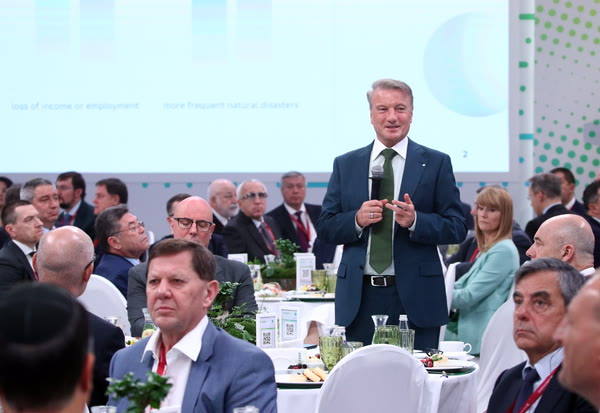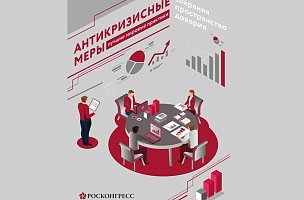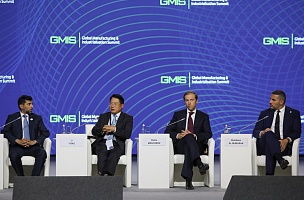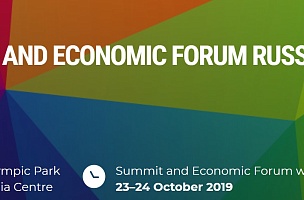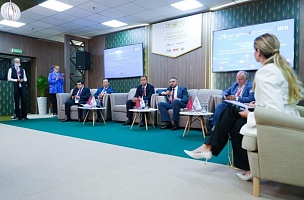KEY CONCLUSIONS
Plans to modernize Russia's economy and social sphere were affected by the pandemic, but the state successfully coped with the difficulties that arose
"The government that came in January 2020 intended to modernize both the economy and social sphere. However, these plans were significantly hampered by the coronavirus that came in around the same time. However, let us give credit where credit is due, Russia was able to get through this difficult year and a half quite effectively. Today, Russia is listed among the countries that have successfully overcome such a difficult period," Herman Gref, Chief Executive Officer, Chairman of the Executive Board, Sberbank.
"The government did brilliantly well and showed incredible rigor during this crisis. The anti-crisis work, the way the government handled COVID, everything that happened last year – this can be applauded. Another upside is that decisions which used to take years to discuss alone are now made in a matter of days. This is a completely different quality of work, so things are getting better," Andrey Makarov, Chairman of the Committee on Budget and Taxes, The State Duma of the Federal Assembly of the Russian Federation.
The new Russian authorities are very client-centric
"We wondered what makes this government different from all the previous ones. We brainstormed and identified two factors that significantly set this government apart. The first factor is the client-centricity of the state. They put the slogan or technology of client-centricity in the center of all their policies. The second factor is the construction of a digital platform. Digitalization is at the heart of all the other transformations. These two things run through all the sectors: education, healthcare, the very system of public administration, infrastructure, entrepreneurship – all areas are permeated by these two themes," Herman Gref, Chief Executive Officer, Chairman of the Executive Board, Sberbank.
"Another important factor is that the government is talking about client-centricity. It is extremely important. Client-centricity is a dialogue: I talk to people about what they need, I try to do what they need. This, of course, is a real disruption, an exceptionally important discourse, an exceptionally important breakthrough," Vladimir Mau, Rector of the Russian Presidential Academy of National Economy and Public Administration (RANEPA).
"We are discussing this here at the table, but we are the state. <...> This is how we look from the government: we are the state. And everything we do, we do for us, we cannot be separated from society, and society separated from us. We are the state as a whole," Dmitry Grigorenko, Deputy Prime Minister of the Russian Federation and Chief of the Government Staff.
PROBLEM
The uncertainty of the future in a rapidly changing environment requires new management solutions
"The key problem the government faces now is the removal of uncertainty. In general, we live in a world of dramatically increasing uncertainty, which comes from technology. Never in the world have technological priorities changed within a generation. <...> This is an unprecedented shock in terms of predictability, long investments. People like to talk about long investments, when in the process of long investments priorities change," Vladimir Mau, Rector of the Russian Presidential Academy of National Economy and Public Administration (RANEPA).
"The future is uncertain. So, of course, we have to focus on changing mechanisms in all of this. And public mechanisms that make our budgets more resilient and more receptive to new challenges," Maxim Reshetnikov, Minister of Economic Development of the Russian Federation.
Social problems hinder the formation of human capital in Russia
"The number one problem is education, the second is the entrepreneurial climate, then public administration and health care. These are the four problems, the solution to which, according to those present, are the main tasks of the government," Herman Gref, Chief Executive Officer, Chairman of the Executive Board, Sberbank.
"The concerns include poverty, rising prices for the most basic foods, medicines, the availability of medical care, the availability of drugs, the quality of medicine, and education. What people are concerned about the most is the quality of life. But without quality of life, without a real solution to these problems we will not get human capital, which is necessary to ensure the economic breakthrough. <...> Without quality of life in our country, Silicon Valley will still be more attractive to IT people than Malakhovka," Andrey Makarov, Chairman of the Committee on Budget and Taxes, The State Duma of the Federal Assembly of the Russian Federation.
SOLUTIONS
The state should invest in the creation of infrastructure, involving business as a partner
"In many ways, low investment activity is low not only in our country. In most countries of the world, savings prevail over investment, including China and Europe. In this situation, in my opinion, the state can become the investor of last resort. This is also a mechanism for reducing uncertainty. Social, transport and digital infrastructures should be a priority for investment," Vladimir Mau, Rector of the Russian Presidential Academy of National Economy and Public Administration (RANEPA).
"The government has made a breakthrough and public investment started pouring in. But state investment cannot go on forever. If there is no private investment, it will all come to naught, as it has repeatedly happened in the history of our country. And there will be no private investment if there is no investment climate," Andrey Makarov, Chairman of the Committee on Budget and Taxes, The State Duma of the Federal Assembly of the Russian Federation.
"The key driver of this process is the business. It is all about creating conditions for business. We have set ourselves a simple task: to reduce the investment construction cycle by 30%. We will bring these 137 conciliation procedures down to 50 already this year. How much does that cost? In the coming decades this is a market for the country that amounts to more than 100 trillion," Marat Khusnullin, Deputy Prime Minister of the Russian Federation.
The transformation of Russia requires a comprehensive solution: modernization in each of the spheres of society, a change in the state corporate culture
"We have begun to modernize employment centres in the territories of the Russian Federation. Never before have there been KPIs for those who work at employment centers. We are standardizing this service throughout the Russian Federation, digitizing it, and forming a unified platform to create an inter-territorial unified labor market, so that we have the opportunity to employ a citizen outside of where he or she lives. If necessary, we can help them move," Anton Kotyakov, Minister of Labor and Social Protection of the Russian Federation.
"Probably we should put personal care for the patient at the top of the list – and that need exists today. And on the other hand, we should prioritize responsibility for one's own health. <...> Personalization using digital technology is a necessary thing," Mikhail Murashko, Minister of Health of the Russian Federation.
"With the money we have, many other countries are doing bigger and better things. So money plus client-centeredness is exactly the new quality of services that we have to provide for our people. And if we take money, plus a little bit of soul of those people who work in the public sector, that will create a terrific effect," Anton Siluanov, Minister of Finance of the Russian Federation.
For more information, visit the ROSCONGRESS.ORG Information and Analytical System.


